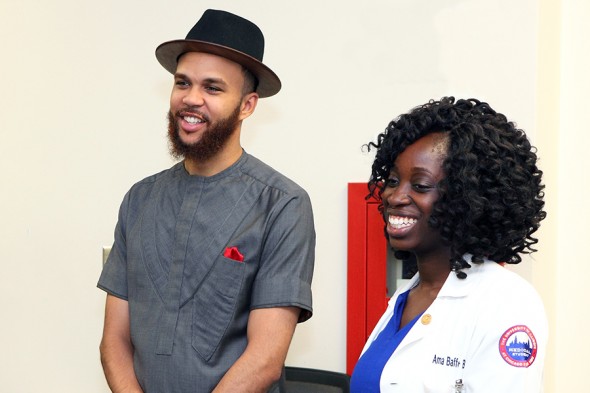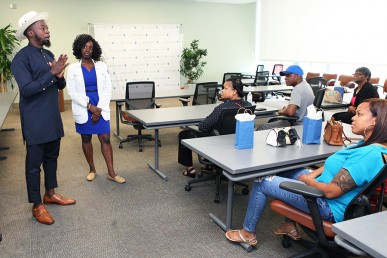Musicians visit UI Health Sickle Cell Center

Hip-hop artist Jidenna visits the UI Health Sickle Cell Center Aug. 3 before performing at Lollapalooza. His visit was organized by the nonprofit AllOneBlood, with help from UIC medical student Ama Baffoe-Bonnie (right). Photo: Jenny Fontaine
Nana Kwabena considers his sickle cell disease a superpower.
“I am who I am, not in spite of sickle cell disease, but because I have [it],” the Grammy-nominated songwriter said at the UI Health Sickle Cell Center during an intimate conversation with patients Aug. 3.

Grammy-nominated songwriter Nana Kwabena (left), and his sister, Ama Baffoe-Bonnie, a UIC medical student, talk with UI Health Sickle Cell Center patients. Photo: Jenny Fontaine
Seven UI Health patients in the room — and their families and friends — nodded.
“We are powerful people,” Kwabena said.
During his visit, Kwabena introduced a close friend and integral part of his support system: hip-hop recording artist and producer Jidenna, known for his hit single “Classic Man,” released in 2015. Jidenna visited UIC before performing at Lollapalooza Aug. 4.
“I admire [Kwabena] and I admire each and every one of you because I’m in this community and I know how much it is to push through,” said Jidenna, a Wondaland artist. “So it’s an honor to be amongst fighters.”
Kwabena talked about his experience with sickle cell — a disease that makes it difficult for blood cells to pass through blood vessels because of their crescent shape. This leads to blockages of blood to organs and tissues, which can result in excruciating pain, organ failure, stroke and death. Sickle cell disease affects about 100,000 Americans, according to the Centers for Disease Control and Prevention.
Kwabena was inspired to found the nonprofit advocacy organization AllOneBlood after his brother died from complications of the disease in 2011. His sister, Ama Baffoe-Bonnie, a third-year UIC medical student, helped arrange Kwabena’s visit to UI Health, where he learned about the hospital’s use of stem cell transplants to cure adults with the disease.
He and Jidenna also visited two transplant patients, one adult in crisis, one pediatric patient and two people in the Acute Care Center. They handed out hats and T-shirts, but their greatest contribution was making people smile.
“A lot of the patients are in pain or are in here for several days or weeks,” said Santosh Saraf, assistant professor of medicine. “Seeing them makes the patients upbeat and happy.”
The visit helped the sickle cell team share information about the hospital’s advancements. For more than 50 years, UIC and its hospital, UI Health, have pioneered sickle cell research and treatment. Under UI Health’s care, 25 patients have been cured through a bone marrow transplantation — 20 from matched sibling donors and five from half-matched relative donors. The cure is known for not using preparative chemotherapy, a step that’s usually too risky for adult patients, and it offers a less harsh treatment alternative with fewer serious side effects.
“It’s been all over the news and commercials, webpages, videos, and a lot of people still have no idea,” said 37-year-old Kamia Quinones, who successfully received a transplant from her brother when she was 33.
UI Health leaders talked about the importance of changing conversations around the disease, too.
“Sickle cell disease doesn’t really have a face, and it’s a disease that comes with a stigma,” Saraf said. Patients are sometimes accused of exaggerating their pain, he said.
“People who come out and say they have sickle cell disease or people who try to learn more about it help get the word out, grow more research, and educate others and health care providers so the stigma gets erased and people can be properly treated.”
Ronisha Edwards, a 24-year-old sickle cell patient, said the visit motivated her to keep moving forward in life.
“It was nice to see someone who’s made it but is still passionate about advocacy and helping the community,” she said. “They haven’t forgotten the mission and what’s important. They’re making their voices heard for the people who need it.”
Kwabena said AllOneBlood will be back. The organization’s leaders have plans to partner with the hospital for fundraising efforts early next year.
“This hospital is doing a lot of work on the forefront and cutting edge,” Kwabena said. “It’s a blessing and an honor to come here and I’m a big fan of the work being done.”
